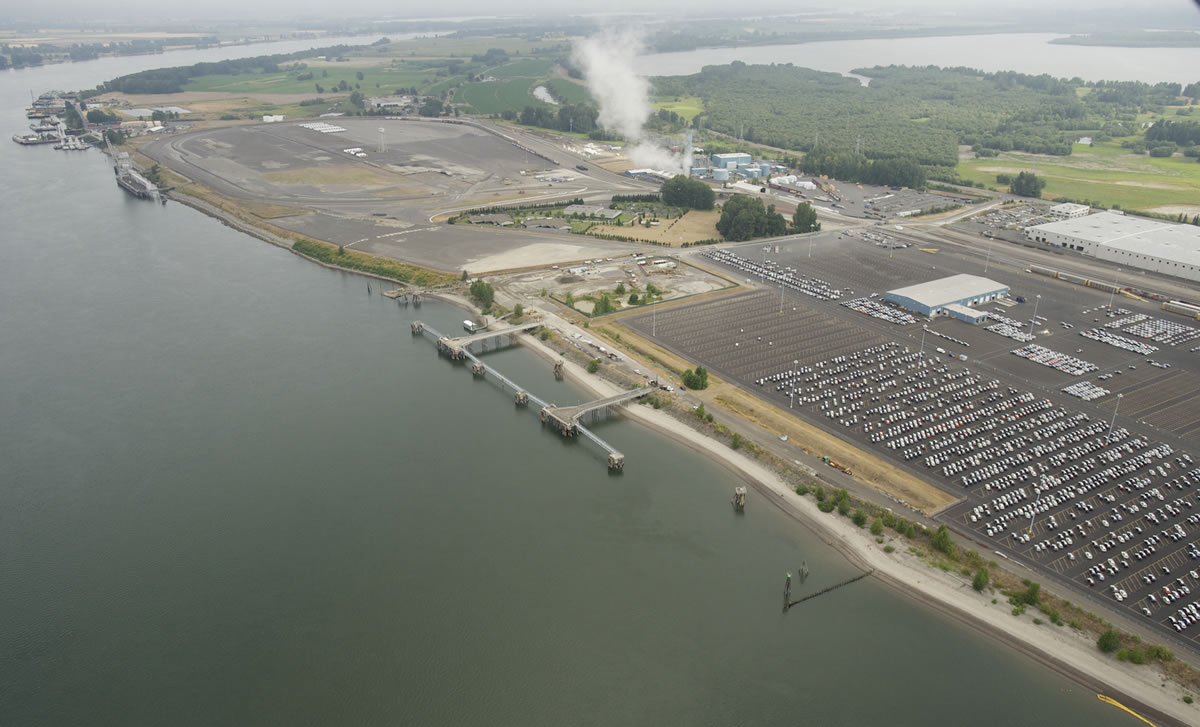Opponents of a planned oil-by-rail terminal at the Port of Vancouver urged the port Tuesday to cancel its lease with Tesoro Corp. and Savage Companies. They leveled several arguments against the project, including that it undermines commercial/residential redevelopment of Vancouver’s waterfront, won’t help America achieve energy independence, and puts people in harm’s way.
Eight people, all critical of the proposal to build the largest oil transfer facility in the Northwest, spoke to port Commissioners Nancy Baker, Jerry Oliver and Brian Wolfe during the open forum portion of the commission’s regular public hearing.
Den Wichar, a resident of Vancouver’s Hough Neighborhood, said public opposition has increased and more oil-train accidents have occurred since commissioners voted unanimously in October to approve the lease. Since that time, regulators also discovered that Bakken oil from North Dakota — the kind of crude that the proposed facility would handle — was misrepresented and mislabeled, Wichar said. And the current fleet of oil tank cars was found to be inadequate for safely moving oil.
“At this point,” Wichar said, “I want (the port) to revisit the (lease) decision and vote no.”
Addressing those who spoke, Wolfe, the commission’s president, said the three commissioners are listening to them and reading the same news reports about oil trains and related issues.
The lease, worth $45 million to the port over an initial 10 years, isn’t the final word on whether the oil terminal moves forward. The proposal is undergoing a lengthy environmental examination by the state Energy Facility Site Evaluation Council. Washington’s governor has the final say over whether the project gets permitted.
“We get to take another look at it after the EFSEC process is done,” Wolfe said after opponents spoke Tuesday.
Previously, port officials have said that Tesoro and Savage would have to agree to stringent rail and operation safety plans before the port would allow them to operate the oil transfer terminal.
But opponents urged commissioners to back out of the lease now.
Marion Ward said the port’s lease approval “puts the health and safety of our citizens at risk” and harms the “reputation and desirability” of Vancouver as a place to live and work.
Arguments that the oil terminal will help solidify America’s energy independence are untrue, Ward said, in light of efforts by oil companies to lobby Congress to lift the ban on exporting crude oil.
Don Steinke said the port’s arguments that a planned $1.3 billion commercial/residential redevelopment of Vancouver’s waterfront and the oil terminal can coexist are true only if waterfront investors decide to go ahead with their project.
Backers of the waterfront project have said it won’t proceed if the oil terminal is built. “What would you rather leave as your legacy,” Steinke asked commissioners, “a smelly oil terminal or a beautiful waterfront?”
Port commissioners unanimously approved a lease with Tesoro and Savage in late July, then held a second
public hearing and vote Oct. 22 in response to public concerns that the July vote violated state open public meetings law.
Tesoro and Savage want to build a $110 million oil terminal at the port that would handle as much as 380,000 barrels of crude per day for eventual conversion into transportation fuels. They say the oil terminal is critical to economic development and energy independence, fits the industrial site where it would be built and can coexist with the plan to rejuvenate Vancouver’s waterfront.
The companies submitted their permit application to EFSEC on Aug. 29. EFSEC’s review is expected to take more than a year. Eventually, it will make a recommendation to the governor, who may accept the proposal, reject it or send it back to the council for more work.




